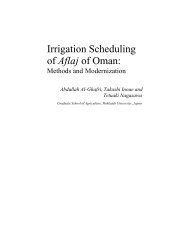The Global Water Crisis: Addressing an Urgent Security - Unu-inweh ...
The Global Water Crisis: Addressing an Urgent Security - Unu-inweh ...
The Global Water Crisis: Addressing an Urgent Security - Unu-inweh ...
Create successful ePaper yourself
Turn your PDF publications into a flip-book with our unique Google optimized e-Paper software.
esources, <strong>an</strong>d such reasonable <strong>an</strong>d just limits as are necessary in a free <strong>an</strong>d democratic society. <strong>The</strong> right to water does<br />
not obligate nations to share their water resources with other nations, as state sovereignty is unimpaired by recognition<br />
of the right. <strong>The</strong> fact that water is a hum<strong>an</strong> right does not me<strong>an</strong> that it should be free, <strong>an</strong>y more th<strong>an</strong> health care is free.<br />
Charging a price for water that reflects its full costs is justifiable on grounds of ecology, equity, <strong>an</strong>d efficiency, although a<br />
basic qu<strong>an</strong>tity of free or subsidized water must be offered for economically disadv<strong>an</strong>taged communities <strong>an</strong>d individuals.<br />
2. International Recognition of the Right to <strong>Water</strong><br />
Although mention of the right to water dates back to the Mar Del Plata Action Pl<strong>an</strong> that emerged from the United Nations<br />
(UN) Conference on <strong>Water</strong> in 1977, there is not yet a global hum<strong>an</strong> rights treaty establishing this right in explicit, universal<br />
<strong>an</strong>d legally-binding terms. Almost all nations have endorsed non-binding political declarations that mention the right to<br />
water, such as the Programme of Action of the 1994 Cairo International Conference on Population <strong>an</strong>d Development,<br />
endorsed by 179 States (United Nations Department of Public Information, 1995). Article 14(h) of the Convention on the<br />
Elimination of Discrimination Against Women provides for the right “to enjoy adequate living conditions, particularly in<br />
relation to … water supply” (United Nations General Assembly, 1979). Article 24(2)(c) of the Convention on the Rights<br />
of the Child sets forth children’s right to “adequate nutritious foods <strong>an</strong>d cle<strong>an</strong> drinking-water” (United Nations General<br />
Assembly, 1989).<br />
<strong>The</strong> right to water is not explicitly included in the Universal Declaration of Hum<strong>an</strong> Rights (United Nations General Assembly,<br />
1948) or the International Coven<strong>an</strong>t on Economic, Social, <strong>an</strong>d Cultural Rights (ICESCR) (United Nations General Assembly,<br />
1966). However, implicit rights to water <strong>an</strong>d s<strong>an</strong>itation are arguably included in Article 25 of the Universal Declaration<br />
through “the right to a st<strong>an</strong>dard of living adequate for the health <strong>an</strong>d well-being of himself <strong>an</strong>d of his family” (United<br />
Nations General Assembly, 1948: 5) <strong>an</strong>d Articles 11 <strong>an</strong>d 12 of the ICESCR through “the right of everyone to <strong>an</strong> adequate<br />
st<strong>an</strong>dard of living <strong>an</strong>d health” <strong>an</strong>d “the right of everyone to the enjoyment of the highest attainable st<strong>an</strong>dard of physical<br />
<strong>an</strong>d mental health” (United Nations General Assembly, 1966: 7-8). <strong>The</strong> UN Economic <strong>an</strong>d Social Council published General<br />
Comment No. 15 on the Right to <strong>Water</strong> in 2002, providing guidelines for the interpretation <strong>an</strong>d implementation of the<br />
right (UN Economic <strong>an</strong>d Social Council, 2002). General Comment No. 15 identifies a suite of core obligations related to<br />
the right to water for immediate implementation, as follows:<br />
(a) To ensure access to the minimum essential amount of water that is sufficient <strong>an</strong>d safe for personal<br />
<strong>an</strong>d domestic uses to prevent disease;<br />
(b) To ensure the right of access to water <strong>an</strong>d water facilities <strong>an</strong>d services on a non-discriminatory basis,<br />
especially for disadv<strong>an</strong>taged or marginalized groups;<br />
(c) To ensure physical access to water facilities or services that provide sufficient, safe <strong>an</strong>d regular<br />
water; that have a sufficient number of water outlets to avoid prohibitive waiting times; <strong>an</strong>d that are<br />
at a reasonable dist<strong>an</strong>ce from the household;<br />
(d) To ensure personal security is not threatened when having to physically access water;<br />
(e) To ensure equitable distribution of all available water facilities <strong>an</strong>d services;<br />
(f) To adopt <strong>an</strong>d implement a national water strategy <strong>an</strong>d pl<strong>an</strong> of action addressing the whole population;<br />
(g) To monitor the extent of the realization, or the non-realization, of the right to water;<br />
(h) To adopt relatively low-cost targeted water programmes to protect vulnerable <strong>an</strong>d marginalized groups; <strong>an</strong>d,<br />
(i) To take measures to prevent, treat, <strong>an</strong>d control diseases linked to water, in particular ensuring access to<br />
adequate s<strong>an</strong>itation (UN Economic <strong>an</strong>d Social Council, 2002).<br />
An earlier General Comment published by the UN Economic <strong>an</strong>d Social Council confirmed that governments have a core<br />
obligation to ensure the satisfaction of, at the very least, “minimum essential levels” of each of the rights enunciated in<br />
the International Coven<strong>an</strong>t on Economic, Social, <strong>an</strong>d Cultural Rights (Section 10, UN Economic <strong>an</strong>d Social Council, 1990: 3).<br />
Momentum towards explicit <strong>an</strong>d binding international recognition of the right to water has accelerated in recent years.<br />
In 2007, the UN High Commissioner for Hum<strong>an</strong> Rights concluded “that it is now time to consider access to safe drinking<br />
water <strong>an</strong>d s<strong>an</strong>itation as a hum<strong>an</strong> right [necessary] to sustain life <strong>an</strong>d health” (UN High Commissioner for Hum<strong>an</strong> Rights,<br />
2007: 26). In 2010, the UN General Assembly passed a non-binding resolution recognizing the right to water, with 124<br />
nations voting in favour, none against, <strong>an</strong>d 41 abstaining. <strong>The</strong> resolution stated that “the right to safe <strong>an</strong>d cle<strong>an</strong> drinking<br />
water is a hum<strong>an</strong> right that is essential for the full enjoyment of life <strong>an</strong>d all hum<strong>an</strong> rights” (UN General Assembly, 2010: 2).<br />
130 <strong>The</strong> <strong>Global</strong> <strong>Water</strong> <strong>Crisis</strong>: <strong>Addressing</strong> <strong>an</strong> <strong>Urgent</strong> <strong>Security</strong> Issue




